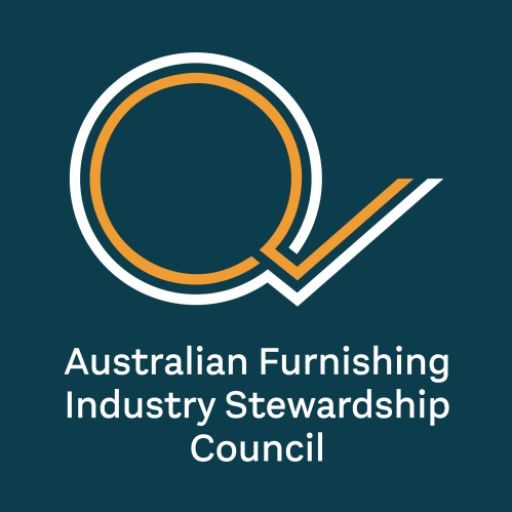The Australian Furniture Association (AFA) and the Australian Furnishing Industry Stewardship Council (AFISC) are dedicated to proactively engaging with government and industry stakeholders on policies and agendas impacting the furniture sector. To ensure our industry’s interests are consistently represented, we actively contribute to key government submissions. These submissions focus on advocating transformative strategies and regulatory adjustments that enhance sustainability, transparency, circular economy principles, and improved business practices across Australia’s furniture industry. Below, you’ll find concise summaries of our recent submissions. The full submissions can be accessed directly HERE
Submission Summaries:
- Greenwashing Submission (Submitted September 2025)
The AFA and AFISC provided a submission to the Senate Environment and Communications References Committee inquiry into greenwashing, focusing on the risks posed by misleading or unclear environmental claims within the furniture industry. The submission highlighted the importance of including furniture, and that such claims not only erode consumer confidence but also create an uneven playing field, disadvantaging businesses that are genuinely investing in sustainability. It reinforced the importance of consistent, transparent, and verifiable information across all furniture markets, including household, commercial, and contract sectors, to ensure trust and accountability.
Key recommendations included:
- The need for clear, verifiable sustainability claims to protect consumers and support informed choices.
- The role of tools such as the Furniture Passport Australia System (FPAS) to provide transparent and credible product information.
- How misleading claims undermine reputable businesses that invest in genuine sustainability practices.
- The importance of recognised third-party certifications and ISO frameworks to ensure credibility and consistency.
- Advocacy for stronger regulatory guidance and enforcement to reduce misinformation across both household and commercial furniture markets.
Relevance: Ensures the furniture industry’s voice is represented in parliamentary processes, strengthens consumer trust, supports fair competition, and underpins the transition to a transparent and sustainable circular economy.
- Basel Convention Submission (Submitted February 2025)
The AFA and AFISC supported amendments to the Basel Convention focusing on the proper categorisation and management of furniture waste, explicitly highlighting furniture as a significant source of persistent organic pollutants (POPs), PFAS, and flame retardants. Recommendations included:
- Classification of furniture as a specific Basel waste disposal category.
- Implementation of Digital Product Passports (DPP) for tracking hazardous furniture materials.
- Strengthening the Prior Informed Consent (PIC) procedure digitally.
- Mandatory declarations for hazardous chemicals in furniture imports and exports.
Relevance: Ensuring imported furniture meets Australian safety standards and reducing contamination in recycled materials, thereby supporting Australian furniture manufacturers.
- Review of the Recycling and Waste Reduction Act Submission (Submitted February 2025)
Advocated for the explicit regulation of furniture as a waste stream, highlighting:
- Landfill impacts and hazardous chemical risks.
- Mandatory product stewardship schemes.
- Widespread adoption of Furniture Passport Australia System (FPAS) for comprehensive traceability and sustainability.
Relevance: Addresses industry responsibility for furniture waste, drives circular economy initiatives, and ensures environmental compliance and safety.
- Federal Treasury Pre-Budget Submission (Submitted January 2025)
AFA and AFISC advocated for the Furniture Passport Australia System (FPAS), aimed at:
- Meeting new government regulatory requirements (ESP Policy).
- Improving supply chain transparency.
- Promoting circular economy practices by facilitating repair, reuse, and recycling.
- Consolidating industry certifications and enabling material traceability.
Relevance: Critical for compliance with incoming environmental procurement regulations and for positioning Australia’s furniture industry as a global sustainability leader, fostering growth and market competitiveness.
- Select Committee on PFAS Submission (Submitted December 2024)
Highlighted the significant use and impact of PFAS in imported furniture, recommending stronger regulatory controls and industry-led initiatives like FPAS to ensure chemical safety, supply chain traceability, and compliance with IChEMS and NEMP standards.
Relevance: Critical to reducing environmental and health impacts from hazardous chemical use in furniture, reinforcing safety standards, and supporting Australian manufacturers.
- National Framework for Recycled Content Traceability Submission (Submitted November 2024)
Submission responding to DCCEEW’s National Framework, advocating robust recycled content traceability through the Furniture Passport System (FPS). Key highlights include:
- Detailed lifecycle data and digital product passports.
- Monitoring hazardous chemicals and enhancing transparency.
- Integrating seamlessly into existing industry supply chains.
Relevance: Supports verifiable recycled content claims, enhances consumer confidence, and significantly advances circular economy practices.
- Environmentally Sustainable Procurement (ESP) Policy Submission (Submitted November 2024)
Addressed the prioritisation of sustainability in government procurement, recommending:
- Further emphasis on product durability, local manufacturing, and circular economy practices.
- Utilisation of Digital Product Passports (DPPs) for accurate sustainability data.
- Lower reporting thresholds to capture broader sustainability impacts.
Relevance: Strengthening sustainability reporting and verification mechanisms, providing clarity and opportunities for local furniture manufacturers.
- ACCC Consumer Goods (Infant Sleep Products) Safety Standard Amendment (Submitted October 2024)
Supported proposed amendments to address inconsistencies within mattress safety guidelines, recommending alignment with Australian/New Zealand Standards (AS/NZS 2172:2013).
Relevance: Enhances regulatory clarity and safety, ensuring consistent industry compliance benefiting manufacturers and consumers.
- Australian Business Definition for Commonwealth Procurement (Submitted October 2024)
Advocated for defining Australian businesses based on local manufacturing, supply chain contributions, sustainability compliance, and ethical procurement standards. Recommended using tools like DPPs for transparency and traceability.
Relevance: Encourages sustainable local manufacturing, supports Australian SMEs, and aligns with Commonwealth Procurement Rules to enhance domestic market stability and growth.
Conclusion
These submissions by the Australian Furniture Association (AFA) and the Australian Furnishing Industry Stewardship Council (AFISC) collectively advocate for systemic changes critical to transitioning Australia’s furniture industry towards greater sustainability, regulatory compliance, enhanced transparency, and robust circular economic practices. The proposed frameworks and initiatives represent meaningful advancements in material traceability, industry guidance, and improved business practices, equipping our members with clearer direction, practical support, and essential resources to thrive. Through these efforts, AFA and AFISC are committed to strengthening industry accountability, driving operational excellence, and significantly enhancing the global competitiveness, resilience, and reputation of the Australian furniture industry.
For more information about member benefits and how to become an AFA or AFISC Member contact the Australian Furniture Association at membership@theafa.asn.au or the Australian Furnishing Industry Stewardship Council at care@afisc.eco
About AFISC
The Australian Furnishing Industry Stewardship Council (AFISC) is leading the charge in redefining Australia’s furniture and furnishing sector. Driving a sustainable circular economy model that prioritises product longevity, repairability, recyclability, and the use of low-impact, innovative materials. Aligning with global sustainability goals, AFISC is empowering the industry to drastically reduce its environmental footprint and become a global leader in sustainable innovation.
At the heart of AFISC’s mission are groundbreaking initiatives like the Furniture Passport Australia System (FPAS), which offers unparalleled traceability and transparency. FPAS empowers manufacturers, retailers, and consumers to make responsible, informed decisions that champion sustainability.
Our work extends beyond tools and systems – AFISC collaborates with local innovators to explore cutting-edge solutions and enhance the transition to more sustainable solutions. Through alliances, research, and actionable strategies, we are building a future where the Australian furniture industry thrives as a transparent, responsible, and fully circular economy.
About the AFA
The Australian Furniture Association (AFA) is recognised as the peak industry association for the furnishing sector supply chain in Australia. Collectively the industry employs more than 250,000 Australians directly and up to 500,000 indirectly. With an estimated value of $27.4 billion, the furnishing industry is an important contributor to the economic well-being and wealth of the nation.
Our vision is to Grow, Promote and Protect the industry. AFA Members benefit from being part of a collective and respected voice.
AFA delivers quality, industry relevant, professional services to the furniture design, manufacturing and distribution supply chain with a focus on advanced manufacturing, standards, testing, certification, compliance, training, sustainable business development and advocacy on behalf of stakeholders and strategic industry partners.
The AFA works closely with Australian Governments on various industry and furnishings related projects by providing advice and conducting extensive and wide-ranging research studies on matters that affect the sector and is the recognized as voice of the furnishing industry by government, media and the general public.

